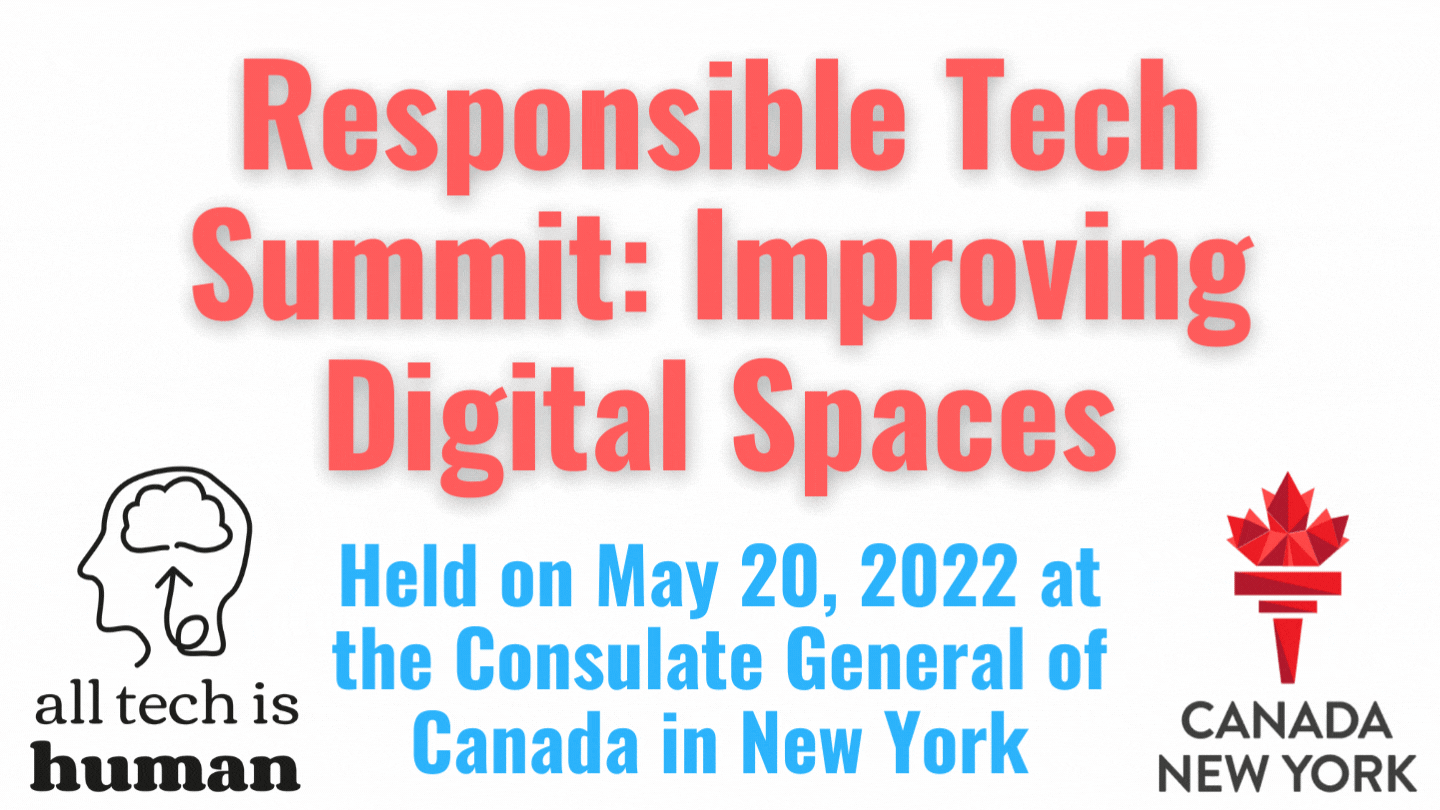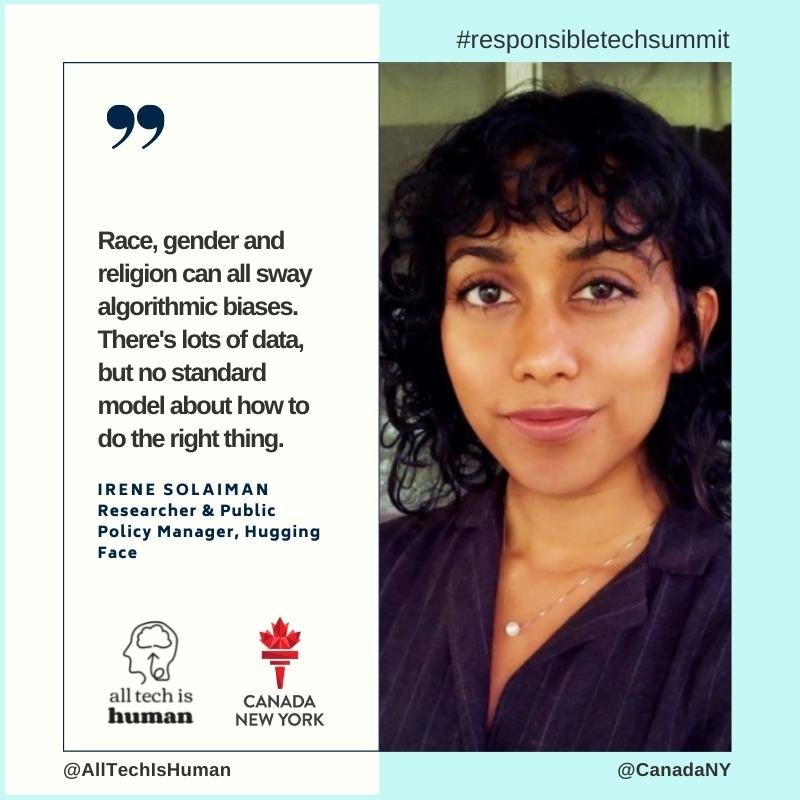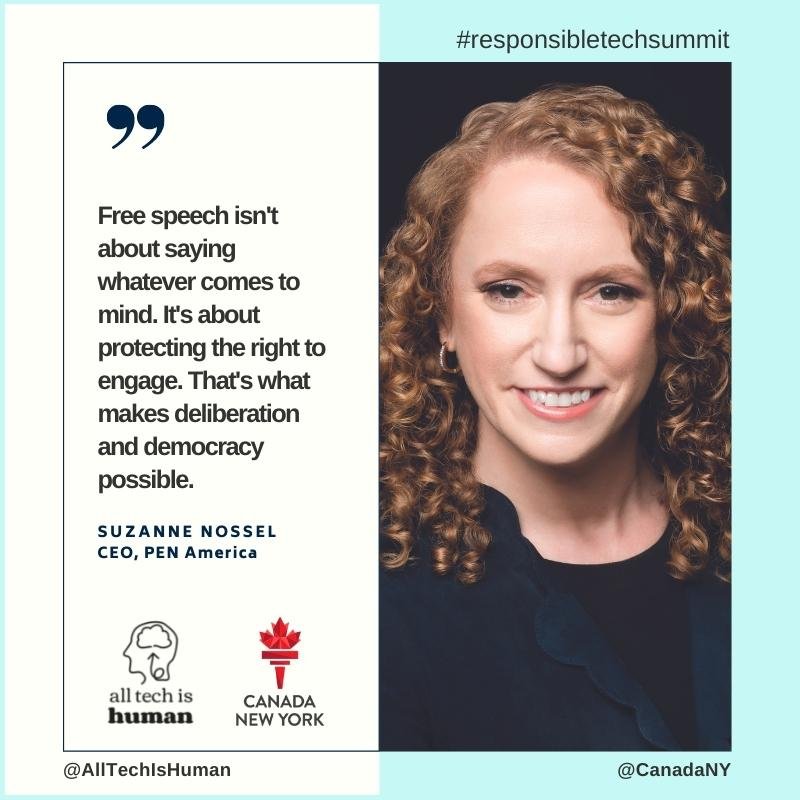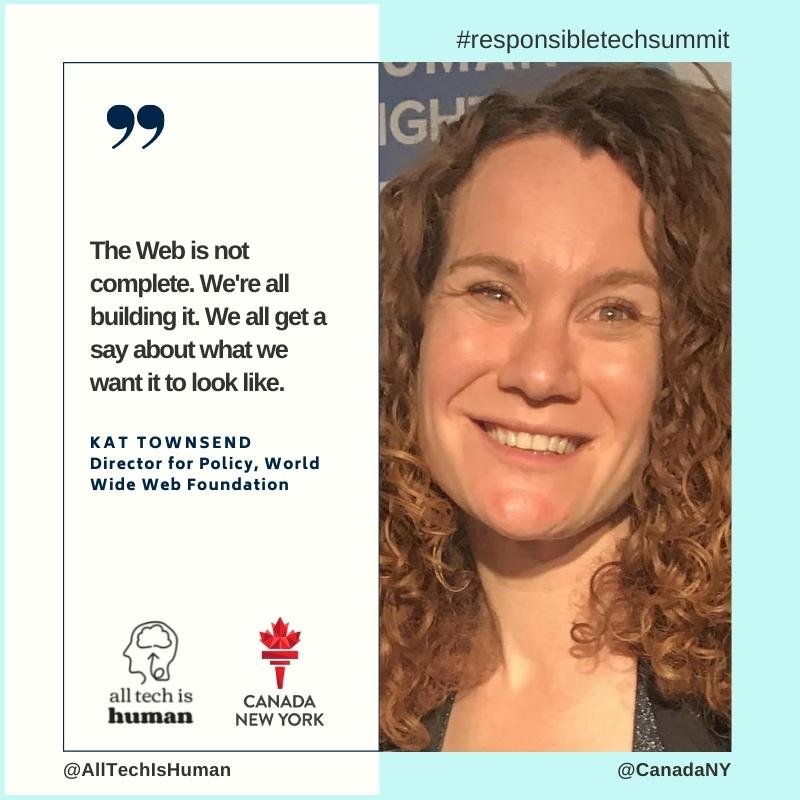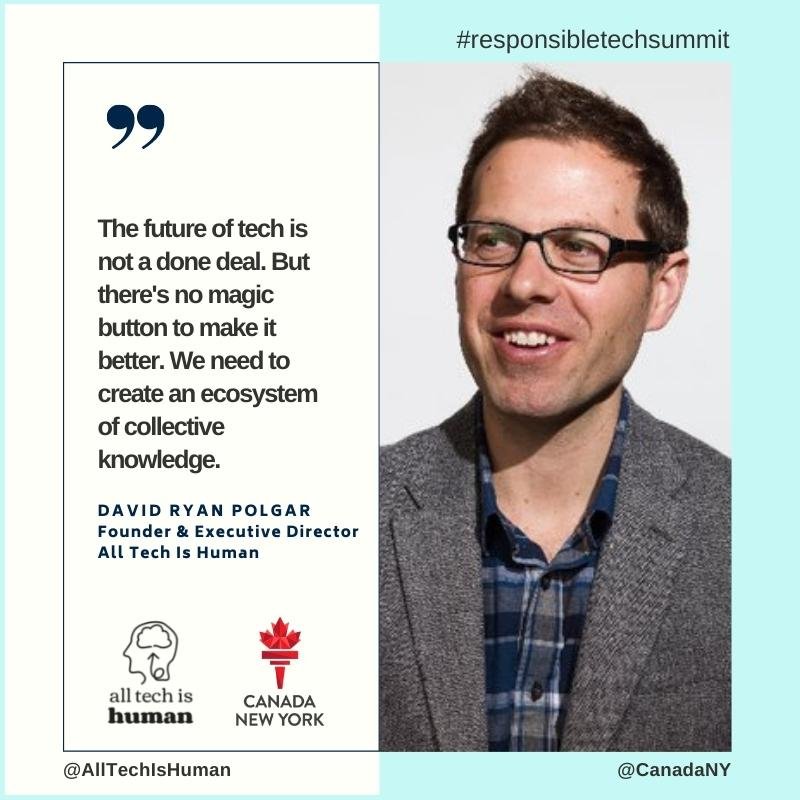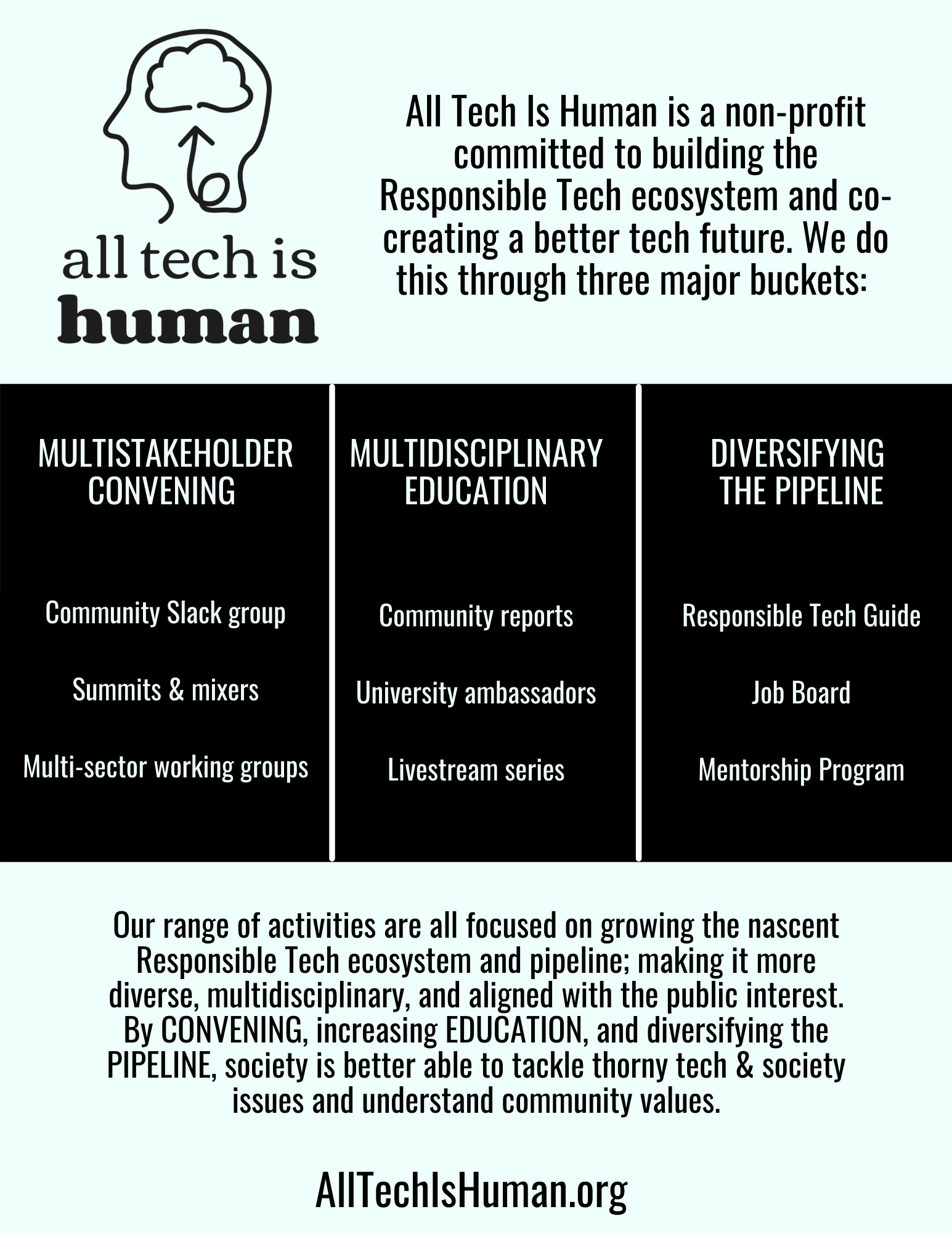Responsible Tech Summit: IMPROVING DIGITAL SPACES
On May 20th, we brought together a broad range of stakeholders from across civil society, government, industry, and academia to discuss and collaborate on ways to improve digital spaces. People flew into NYC from across the United States, Canada, the UK, Europe, and Australia with speakers from the United Nations, eSafety Commissioner of Australia, UK Cabinet Office, Center for Humane Technology, New_ Public, Web Foundation, OfCom, Meta, Center for Democracy and Technology, Tony Blair Institute for Global Change, the Web Foundation, and more.
Two of our recent reports dealt specifically with improving digital spaces. Our most recent is called the HX Report: Aligning Our Tech Future With Our Human Experience. All Tech Is Human is a member of the HX Project, alongside organizations such as Aspen Institute, Data & Society, Project Zero, and Headstream, to have an “approach to talking about, engaging with, and designing technology in a way that is aligned with our needs as humans — not users.” In our HX Report we took a holistic approach to improving digital spaces, looking at product design, business models, content moderation, digital citizenship, tech augmentation, and tech & wellbeing.
And previous to the HX Report, our organization released Improving Social Media: The People, Organizations, and Ideas for a Better Tech Future. These two reports featured resources from over 150 organizations doing valuable work in the ecosystem, and included profile interviews with over 80 leaders focused on improving digital spaces.

Videos from the Responsible Tech Summit
The Responsible Tech Summit was livestreamed directly from the Consulate General of Canada in New York. You can find the playlist here and all of the individual videos below.
Welcome to the Responsible Tech Summit
Introductory Remarks by Saliou N. Babou, Consul and Head of Innovation, Consulate General of Canada in New York
Welcoming Remarks by André Frenette, Deputy Consul General of Canada in New York
Remarks by David Ryan Polgar, Founder & Director, All Tech Is Human (starts at 11:05)
PANEL #1 | What does free expression look like in digital spaces?
Suzanne Nossel, CEO of PEN America
Amruta Deshpande, Researcher at Graphika
Nora Benavidez, Director, Digital Justice & Civil Rights at Free Press
Moderator Jamie Cohen, Assistant Professor at CUNY Queens College, social media and digital activism.
Fireside chat #1 | Yu Ping Chan, United Nations
Fireside chat with Yu Ping Chan, Senior Programme Officer, Office of the Secretary-General’s Envoy on Technology at the United Nations.
Interview by Justin Hendrix, CEO & Editor of Tech Policy Press.
PANEL #2 | Imagining Positive Digital Spaces
Joi Rae, Head of Operations and Partnerships at New_ Public
Gabo Arora, Award-winning immersive artist, former UN diplomat
Dona Bellow, Trust & Safety Professional Association advisor
Saima Akhtar, Associate Director, Vagelos Computational Science Center at Barnard College
Fireside chat #2 | Julie Inman Grant
A conversation with Australia’s eSafety Commissioner, the world’s first government regulatory agency committed to keeping its citizens safer online.
In conversation with Matt Nguyen, Digital Governance and Rights Lead, Tony Blair Institute.
PANEL #3 | Algorithmic Transparency in Digital Spaces
Renée Cummings, Data Activist in Residence at the University of Virginia
Irene Solaiman, AI Researcher and Public Policy Manager at Hugging Face
Natalia Domagala, Head of Data and AI Ethics at UK Cabinet Office
Moderator Maria Bridge, Chief Communications Officer at Center for Humane Technology
TOPICAL CONVERSATION: Creating a tech pipeline aligned with the public interest
Laura McGee, CEO of Diversio
Azhar Janjua, Head of Communitech Outposts
Vivian Chong, Yale MBA
Moderator Ayca Ariyoruk, Director of Global Partnerships and Communication at Soliya
PANEL #4 | Tech Policy & Social Media: Where Are We Headed?
Fred Langford, Director of Online Technology at Ofcom
Dhanaraj Thakur, Research Director at the Center for Democracy & Technology
Harsha Bhatlapenumarthy, Governance Manager, Meta
Moderator Kat Townsend, Director for Policy at the Web Foundation
Fireside chat #3 | Yaël Eisenstat
Interviewed by Betania Allo, Cyber law and policy expert, former UN officer in counter-terrorism
Closing Remarks
BIOS FOR SPEAKERS
Julie Inman Grant is Australia’s eSafety Commissioner. In this role, Julie leads the world’s first government regulatory agency committed to keeping its citizens safer online.
Julie has extensive experience in the non-profit and government sectors, and spent two decades working in senior public policy and safety roles in the tech industry at Microsoft, Twitter and Adobe.
The Commissioner’s career began in Washington DC, working in the US Congress and the non-profit sector before taking on a role at Microsoft. Julie’s experience at Microsoft spanned 17 years, serving as one of the company’s first and longest-standing government relations professionals, ultimately in the role of Global Director for Safety & Privacy Policy and Outreach. At Twitter, she set up and drove the company’s policy, safety and philanthropy programs across Australia, New Zealand & Southeast Asia. As Commissioner, Julie plays an important global role as Chair of the Child Dignity Alliance’s Technical Working Group and as a Board Member of the WePROTECT Global Alliance.
Dona Bellow serves as an Advisor to the Trust & Safety Professional Association, which supports the community of professionals who help develop and enforce the principles that define acceptable behavior and content online. In addition, she currently leads Policy & Responsible Innovation programs at a social messaging startup. Dona began her tech career at Google, conducting policy evaluation and operationalization for legal content removal requests, and managing the Child Safety program which led her to become an advocate for reviewer wellness and mental health. After leaving Google, she continued growing her expertise in connecting safety risks, policy analysis and product development, as a Community Policy Manager at Airbnb and then as a T&S process analyst at Twitter. Later, she joined Meta as a Responsible Innovation Manager supporting product teams to better anticipate and address potential harms in technology, including its impact on vulnerable groups.
Gabo Arora is a world renowned multi-award winning immersive artist, professor, entrepreneur and former UN diplomat who works with the most cutting-edge emerging technologies, including virtual and augmented reality, to tell some of the most important stories of our time. He has designed and led campaigns of significant measurable impact, raising many millions of dollars, for the United Nations, UNICEF, USC Shoah foundation and the Nobel Peace Prize committee. He has had the honor of being the UN’s first-ever Creative Director; a Davos World Economic Forum Arts and Culture Leader; a member of the Council on Foreign Relations; and is the Founding Director of a new lab and academic department - the first of its kind - dedicated to Immersive Storytelling and Emerging Technologies (ISET) at Johns Hopkins University. His creative tech and production studio LIGHTSHED.IO is based in Brooklyn.
Yaël Eisenstat is the founder of Kilele Global, a strategic advisory firm that helps companies, governments, and investors align technology to better serve the public. In 2018, she was Facebook’s Global Head of Elections Integrity Operations for political ads. Previously, she spent 18 years working around the globe as a CIA officer, a national security advisor to Vice President Biden, a diplomat, and the head of a global political risk firm. Eisenstat’s commentary has been featured in the New York Times, BBC World News, CNN, CBS News, ABC News, and many more.
Joi Rae is a dedicated public servant who currently serves as Head of Operations and Partnerships at New_ Public, a nonprofit committed to building healthy digital public spaces. She has previously worked in the public, private, and non-profit sectors. Joi has previously served as the Chief of Staff of a non-profit organization focused on eliminating America’s STEM teacher shortage. Prior to that, she spent nearly a decade working in various positions in New York City government at the NYC Mayor's Office and the Manhattan District Attorney's Office.
Fred Langford is Director of Online Technology at Ofcom, the UK Communications Regulator. His current work focuses predominantly on directing Ofcom's technical requirements in relation to the new UK Online Safety regulatory regime. Prior to joining Ofcom in November 2020, Fred was Deputy CEO and Chief Technology Officer at Internet Watch Foundation (IWF) and President of INHOPE (the international CSEA hotline association). He is a highly experienced tech leader with 30 years’ experience in the private sector, civil society, regulation and the military. He currently holds several Board and leadership positions relating to his specialisms, which include internet technologies, governance, security, safety and regulation.
Matt Nguyen is the Digital Governance and Rights Lead within the Technology and Public Policy team at the Tony Blair Institute. His work primarily focuses on the future of online spaces and information ecosystems and their relationship with governance - investigating a range of issues from platform regulation to the implications of Web3. Previously he helped build and was the Policy Lead at Reset Australia, an advocacy organisation combatting the digital threats to democracy.
Kat Townsend is Director for Policy at the Web Foundation which seeks to drive a free, open, and affordable web for all. In her role she leads a global team to drive civil society engagement with the UN Tech Envoy for the Global Digital Compact, running the multisector technology policy design lab including developing trusted design to counter the proliferation of deceptive design or so-called "dark patterns" and improving the work of technology and social media platforms to counter the proliferation of online harassment and gender-based violence.As Executive Director of Open Data Collaboratives, Kat has worked on data-driven prioritization of delivery of COVID-19 vaccines in LMICs for UK FCDO, strategic development of civic tech for social accountability for the World Bank, and data transparency and civic engagement with governments and civil society in Middle East and Africa. Kat served in the U.S. Department of State and the US Agency for International Development (USAID) under President Obama’s innovation and transparency initiative, building technology and collaboration in US foreign policy and with a team of civil servants standing up USAID’s first and sustained open data policy.
Justin Hendrix is cofounder and CEO of Tech Policy Press, a new nonprofit media venture concerned with the intersection of technology and democracy. Previously, he was Executive Director of NYC Media Lab. He spent over a decade at The Economist in roles including Vice President, Business Development & Innovation. He is an associate research scientist and adjunct professor at NYU Tandon School of Engineering, and holds a BA from the College of William & Mary and an MSc in Technology Commercialization from the University of Texas at Austin.
Saima Akhtar is the Associate Director of the Vagelos Computational Science Center (CSC) at Barnard College. She is a computational social scientist with a background in architecture and software engineering. Prior to joining Barnard, Saima was a postdoctoral associate in the Yale University Department of Computer Science, where she managed digital cultural heritage preservation projects between the fields of computer science and architecture. At the CSC, Saima aids in the Center’s mission to lower the barrier of entry into computing by strengthening technical skills and increasing digital literacy for people across all disciplines at Barnard and beyond.
Suzanne Nossel currently serves as the Chief Executive Officer of PEN America, the leading human rights and free expression organization, and she is author of Dare to Speak: Defending Free Speech for All. She is a leading voice on free expression issues in the United States and globally, writing and being interviewed frequently for national and international media outlets. She has served as the Chief Operating Officer of Human Rights Watch and as Executive Director of Amnesty International USA. During the first term of the Obama Administration, Nossel served as Deputy Assistant Secretary of State for International Organizations, where she led U.S. engagement in the United Nations and multilateral institutions, on human rights and humanitarian issues.
In 2021, Nossel was selected as a member of the Oversight Board, an independent body using human rights principles to adjudicate decisions on Facebook and Instagram.
Irene Solaiman is an AI safety expert. She is conducting novel AI research and leading public policy at Hugging Face and advising responsible AI initiatives at OECD and IEEE. Her research includes AI alignment, algorithmic fairness, and combating misuse and malicious use. Her recent speeches include guest lectures at Harvard University and technical talks at large AI labs.
She formerly built AI policy at Zillow Group. Irene also led public policy at OpenAI, where she initiated and led bias and social impact research. Notably, her research on adapting GPT-3 behavior received a spotlight at NeurIPS 2021. She previously advised policymakers on responsible autonomous decision-making and privacy as a fellow at Harvard’s Berkman Klein Center.
Natalia Domagala leads on data and AI ethics policy at the Central Digital and Data Office, Cabinet Office in the UK. She previously advised on open government and open data policies for the Department for Digital, Culture, Media and Sport in the UK, and implemented open data challenges for 360Giving. She has research experience in anthropology, gender, civic tech, and economic development, and she has recently co-edited a book: Situating Open Data: Global Trends in Local Contexts. Natalia is a Policy Fellow at the Centre for Science and Policy, University of Cambridge. She received her MSc in Local Economic Development from the London School of Economics and Political Science and her BA in Anthropology and Media from Goldsmiths, University of London.
Renée Cummings is an AI ethicist, Data Activist in Residence at the University of Virginia, and a co-lead for UVA's involvement in the Public Interest Technology University Network
Renee specializes in ethical AI, AI leadership, diversity, equity and inclusion in AI, algorithmic accountability, data integrity and sovereignty, algorithmic justice, AI policy and AI governance. Using AI and VR to reengineer and reimagine how we think about offending, police accountability, police use of force, police and community relations, public safety, sentencing and public health and AI and VR inspired approaches to homicide reduction, gun and gang violence prevention are all areas of specialization.
Dhanaraj Thakur is Research Director at the Center for Democracy & Technology, where he leads research that advances human rights and civil liberties online. Over the last 15 years, he has designed and led several research projects aimed at tech policy audiences and ranging in scope from multi-national studies to community level work. He has been interviewed and his work quoted in several news media, including WIRED, CNN, the WSJ, the Economist, the Guardian (UK), and the Financial Times, among others. In addition, he has published over 35 peer reviewed journal articles, book chapters, and conference papers; as well as commissioned reports for several civil society organizations, multilateral development banks, and governments.
Dhanaraj previously led research at the World Wide Web Foundation, focusing on broadband access and affordability, gender equality online, and data rights. Prior to that he held political science faculty positions at Tennessee State University and the University of the West Indies (Mona, Jamaica).
Maria Bridge is the Chief Communications Officer at Center for Humane Technology, a non-profit driving a comprehensive shift toward humane technology. In her role, she works to reframe the insidious effects of persuasive technology, expose the runaway systems beneath, and deepen the capacity of decision-makers to take wise action. She began her career in management consulting at Bain & Company and held operating roles at Warby Parker and sweetgreen. She received her MBA from Stanford Graduate School of Business. Maria was inspired to switch careers into ethical tech after understanding the malleability of the mind, as a result of extended insight meditation practice.
Harsha Bhatlapenumarthy is a Governance Manager at Meta, currently leading programs related to the Oversight Board. In addition, she is volunteering at the Trust & Safety Professional Association (tspa.org) where she is leading the roadmap to develop and democratize the trust and safety curriculum, to empower both the global T&S community and the average internet user with context on the various considerations influencing safety, privacy and the enforcement of acceptable behavior and content online. She started her career in consulting, but spent the majority of her 10+ year career working in trust and safety in India, Ireland, and now in the US. She led multiple programs to operationalize policies and scale enforcement, developed strategies and influenced product and policy direction to ensure user safety and combat online harms such as adult sexual exploitation, fraud, scams, and COVID-19 misinformation.
As someone who has greatly benefitted from having access to the computer since the age of five, she is a technology optimist despite witnessing the unpleasant side of humanity during the countless hours she spent moderating user-generated content.
Betania Allo is a cyber law and policy expert, and former Programme Management Specialist at the United Nations Security Council Counter-Terrorism Committee Executive Directorate. She graduated as a lawyer in Argentina, and holds a Master of Laws (LL.M.) with an academic focus on cybersecurity and counterterrorism law and policy from Syracuse University. In addition, she holds a Master's in International Relations with a Graduate Certificate in International Security from Harvard University, and a Postgraduate in Cybersecurity and Compliance from Universitat Internacional de Catalunya. She’s a director at the International Counter-Terrorism Youth Network (ICTYN), the South America Coordinator at NextGen5.0, and an editor at the International Counterterrorism Review (ICTR). Betania lectures at several universities worldwide in cybersecurity and counter-terrorism. Moreover, she is regularly a keynote speaker in conferences about terrorism, emerging technologies, innovation, and feminism. Find out more at www.betaniaallo.com
Jamie Cohen is an Assistant Professor at CUNY Queens College teaching social media and digital activism. Jamie holds a PhD in Cultural and Media Studies specializing in memes and digital culture. He is also the Head of Education for Digital Void, an internet literacies project that bridges the gap between digital life and everyday culture. He founded and formerly directed an internet studies college degree and is a Salzburg Academy on Media and Global Change faculty fellow. Jamie leads teams of students in immersive digital production design projects in Rome, Italy, that focus on site-specific storytelling and digital journalism ethics. Jamie is also the author of Producing New and Digital Media from Routledge and is currently writing a book on the Facebook Papers and American Society and he is also a partner columnist for Medium.
Yu Ping Chan is a Senior Programme Officer in the Office of the Secretary-General’s Envoy on Technology at the United Nations. She coordinates the team’s work on follow-up to the Secretary-General’s Roadmap for Digital Cooperation and the digital-related aspects of his Common Agenda Report, in particular the development of a proposed Global Digital Compact. She also oversees the Office’s overall advocacy, engagement and coordination efforts to strengthen global digital cooperation and its work on other emerging technologies.
Yu Ping previously led the Policy and Regional Support teams in the United Nations Office of Counter-Terrorism. Prior to this, she worked in the UN’s Department of Political Affairs, and in the New York Office of the United Nations Office on Drugs and Crime. Before joining the UN Secretariat, Yu Ping was a diplomat in the Singaporean Foreign Service. She served at the Singapore Mission to the United Nations in New York and before this posting, in the Singaporean Ministry of Foreign Affairs’ department handling the Association of Southeast Asian Nations (ASEAN) and regional political and strategic issues.
Amruta Deshpande is a Senior Research Scientist in Graphika Labs at Graphika Technologies, Inc. Graphika is a leading institution in uncovering disinformation through human and automated analyses. In her role, Amruta leverages social data and advanced methods to characterize disinformation and misinformation in online social media. Additionally, she leverages advanced methods to explore cross platform disinformation operations and behavioral and technological vulnerabilities and indicators of key characteristics that are useful to capture in this space. Amruta has formerly supported investigations that led to Graphika’s testimony on foreign interference in the 2016 U.S. presidential election before the Senate Select Committee on Intelligence.
Nora Benavidez is a civil and human rights attorney and a tireless believer in equal rights for all. She works at the intersection of law, tech, and democracy. She serves as Senior Counsel and Director, Digital Justice & Civil Rights at Free Press, where she leads the organization’s efforts to protect against digital threats to democracy. This includes advocating for media and platform accountability through structural reforms that disrupt the harms disinformation and hate cause to communities and democracies. She previously served as the director of PEN America’s U.S. Free Expression Programs, where she guided the organization’s national advocacy agenda on First Amendment and free expression issues, including press freedom and protest rights. Benavidez launched and led PEN America’s media literacy and disinformation defense program. She also led the organization's groundbreaking First Amendment lawsuit, PEN America v. Donald Trump, to hold the former president accountable for his retaliation against and censorship of journalists he disliked.
Laura McGee is the co-founder and CEO of Diversio, a technology startup that uses data analytics to help companies and investors unlock diversity for improved performance. Diversio works with clients in 30 countries in across the world, and has been featured at global events like the G20 and Davos. Through partnerships including UN Women, the Canadian Venture Capital Association, and the Human Resources Professionals Association, Laura leads industry-level change in DEI practices.
Laura is a serial founder of social movements such as #GoSponsorHer, #HackInclusion, and Summit Leaders. She was named a Top 25 Women of Influence in 2017 and currently serves as Co-Chair of Canada’s Expert Panel on Women Entrepreneurs. Her board positions include ArcTern Ventures, Global Citizen, University of Waterloo, as well as the Ted Rogers School of Management. She is a C100 Fellow and David Rockefeller Fellow with the Trilateral Commission.
David Ryan Polgar is a Responsible Tech advocate, international speaker, and the founder & director of All Tech Is Human. He specializes in uniting a diverse range of stakeholders in order to tackle complex tech & society issues, cultivating conducive environments for forward progress.
As the founder of All Tech Is Human, he has spearheaded the development of the Responsible Tech Guide, along with recent reports on HX: Aligning Our Tech Future With Our Human Experience, Improving Social Media, and The Business Case for AI Ethics.
In March 2020, David became a member of TikTok’s Content Advisory Council, providing expertise around the delicate and difficult challenges facing social media platforms to expand expression while limiting harm. He appears in the upcoming documentary, TikTok, Boom. His commentary has appeared on CBS This Morning, TODAY show, BBC World News, MSNBC, Fast Company, The Guardian, SiriusXM, Associated Press, LA Times, USA Today, and more. The main throughline throughout David’s work is that we need a collaborative, multi-stakeholder, and multi-disciplinary approach in order to build a tech future that is aligned with the public interest.
Ayca Ariyoruk is the Director of Global Partnerships and Communication at Soliya. Soliya is an international non-profit organization and a pioneering Virtual Exchange provider in higher education connecting young people online from the Middle East, North Africa, North America, Europe and Southeast Asia for cross culture understanding to prevent ideological polarization; providing skill and empathy building, and conflict resolution at scale.
In her role, Ayca identifies and cultivates new relationships with public and private stakeholders, primarily with universities and colleges to increase access to Soliya’s programs, and to scale technology enabled cross-border social dialogues. Previously, at the United Nations Association of the USA (now the UN Foundation), she devised policy research and advocacy campaigns in favor of reform and US leadership, and covered issues before the UN Security Council. Ayca’s commentary appeared on Pie News and Thrive Global among other media including the Financial Times, the New York Times, BBC News, Toronto Star, the Independent Uganda, China Daily, Xinhua Net, Business Channel Turkey, the Christian Science Monitor, and Radio France.
Azhar Janjua heads up Communitech Outposts at Communitech, an employer of record service which helps Canadian Founders compliantly hire, manage, retain and pay top talent in 160 countries. He is also Communitech’s principal advisor for immigration assistance and intellectual property programming.
Prior to joining Communitech, Azhar spent time in the Bay Area where he experienced the rapid life of a startup. Attended law school in London, where globalization is key. It is a small world after all! Worked on Bay Street helping multinationals steer their big ships safely. And eventually took a senior role at an Ontario based software company in hypergrowth, where he built out the international legal and operational foundations and infrastructure required to build a remote workforce of over 1,000 humans.
Vivian Chong is a MBA candidate at the Yale School of Management and co-creator of A Business Student’s Guide to Tech Ethics (BSGTE), a curriculum targeted towards MBAs interested in getting involved in the responsible tech movement. She decided to pursue an MBA because she believes that tech business executives have a unique role in addressing the industry’s current harms and can help push the overall industry towards more responsible business practices. Vivian was inspired to co-create BSGTE after going through her own MBA recruiting journey and realizing there were few resources for MBAs interested in the responsible tech field. She hopes to spread BSGTE to other MBA programs and empower the next generation of business leaders to push for change within the tech industry. Prior to her MBA, she was a HR Transformation Consultant at IBM, where she used HR technologies to facilitate healthier workplace communities for her clients. She hopes to build a career focused on building safe and trustworthy communities of belonging on social platforms.
Previous talks from All Tech Is Human
Watch some of the videos below
"There’s no fate but what we make. Technodeterminism is a myth. The future of technology is in our own hands; it doesn’t follow some predestined narrative or glossy CEO fever dream. We can still choose brighter, more positive futures if we want them. I still have immense faith in technology as a transformative and positive force – keeping sight of that promise is what keeps me going." -Cennydd Bowles, Managing Director, NowNext
"Given my background in urban planning and community advocacy, I’ve always prioritized engaging and incorporating the voices and visions of a diverse spectrum of people into my process. In my field of work, I’m usually designing physical or digital tools that aim to improve the quality of life for people who live in cities. That’s why HX feels intuitive to me – HX is built on a foundation of valuing, understanding, and celebrating people first, rather than being distracted by tech solutionism." -Nneka Sobers, Research + Program Manager at Cornell Tech's Urban Tech Hub
"I believe in a future where digital media education is a required school course that’s integrated into the core curriculum." -Tami Bhaumik, Vice President, Civility & Partnerships at Roblox
"To live harmoniously with technology, we should think about how it can enhance the systems that support humanity. We have used technology to solve adjacent inconveniences or a singular issue but not thought of how these inventions create new and future problems. We have arrived at this issue because we have been so focused on a few humans; instead, we need to shift to where the interconnected relationships of the human experience are elevated." -Atulya Chaganty, Multidisciplinary Designer
"As the world becomes increasingly digital, tech companies will become increasingly responsible for designing healthy and safe environments for people, who will also become more educated about these impacts and develop loyalties accordingly." -Michael Preston, Executive Director, Joan Ganz Cooney Center at Sesame Workshop
"We need to have more conversations across disciplines and share best practices openly. I see a lot of conversations among academics and those in the nonprofit sector about the evils of social media, but not a lot of engagement with those in the industry who are actually trying to run community operations such as content moderation." -Alice Hunsberger, Senior Director of Customer Experience, Grindr
"I think, fundamentally, a healthy relationship to technology is a critical one, one that lives in the space between what is possible with technology and how corporate interests prefer we use technology – as data farms. I think we have to learn to use technology outside of the strictures of the app store; a healthy relationship to technology crafts tool use and behaviors to our human needs, not the other way around." -Parker Miles, PhD. Candidate, University of Michigan
"I look around and I see immense possibilities all around me. It could go very badly. We could absolutely come out of this worse than we came in. Anyone -- any future -- can come out on top. So, why not us? Why not team human?" -Sahar Massachi, Co-founder and ED, Integrity Institute
"[T]echnology can never replace the human imagination. As important and ubiquitous as tech is in many of our lives, our experience is shaped by the decisions and actions made by people. It’s a reminder that is as empowering as it is sobering. Tech is created by people. It’s created by us. As long as we can imagine a better tech future, we can certainly build it." -Joi Rae, Head of Operations and Partnerships at New_ Public
"We need to recognize technology is an extension of our physical spaces and thus we need to extend the same degree of civilization, norms, and rules we have governing us in settings like a public plaza, a library, an art museum, a highway, or a school. We need structures, accountability and oversight, with an overriding principle that is centered around the greater good – supporting and benefiting society." -Vicki Harrison, MSW, Program Director, Stanford Psychiatry Center for Youth Mental Health & Wellbeing
"Currently, social media is a me media ("I am so sexy, talented, and/or funny"). We can turn social media into a we media that offers different ways to engage with each other so that our connections are deepened and we feel listened to by others." -Niobe Way, Professor of Psychology, NYU and Co-founder of Agapi
"Without fundamentally changing the business model, we just get slightly less bad social media that doesn’t address root cause issues. To really change things, we need values-driven leadership and values-driven changes to the business model — in coordination with all of the other solutions we’re all working on." -Maria Bridge, Chief Communications Officer, Center for Humane Technology
"What's kept me optimistic has been the enthusiasm from the people around me about technology and folks in our industry who genuinely care for the betterment of humanity and our future. There are countless organizations and folks dedicated to this work, and I do not doubt that their contributions will impact society at large." -Tazin Khan, Founder, Cyber Collective
"The conundrum is not exactly whether platforms moderate too much or too little. it is more about whether platform policies around moderation are guided by the kinds of considerations that social media companies operating in democratic, decidedly anti-racist societies should prioritize."-Oumou Ly, Staff Fellow, Berkman Klein Center for Internet and Society
"While I'd much rather use the carrot, there are times the stick is definitely needed. And, as expressed through our commitment to safety by design, we absolutely believe that industry has to do better in making their platforms safer, more secure and that they need to be both more transparent and accountable for harms that take place on their platforms."-Julie Inman-Grant, eSafety Commissioner of Australia
"This cannot just be left to technologists to solve and lawyers to debate. Social media has a profound impact on all of society, and we are all stakeholders in the ultimate solutions."-Yael Eisenstat, Democracy activist; former Facebook elections integrity head; former diplomat, intel officer and White House advisor
"The scale of the problems of platform management, especially content moderation, but also cross-cultural complexities, push platforms to look for automated, AI-driven solutions that lack nuance and often punish more users who do not look like a platform's imagined average user."-Amanda Lenhart, Program Director, Health + Data, Data & Society Research Institute

The Responsible
Tech Ecosystem


